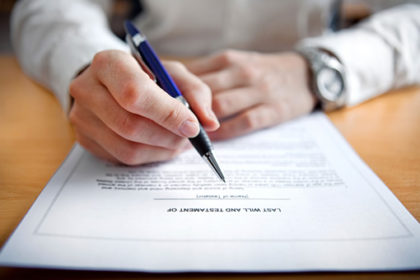
Tipp FM Legal Slot – 21st October 2014 – Wills Review

On Tipp FM, Andrea Gleasure, Solicitor, spoke to Seamus Martin on ‘Tipp Today’ about Wills.
Listen to Andrea’s discussion:
[soundcloud id=’173155834′]
Wills Review
Do most people have wills and what is having a will so important?
Recent research has shown that 82% of people over 65 years have a will whereas just 51% of people between 45 and 64 and 26% of those aged 35 to 44 years have a will.
Many people underestimate the importance of making a will – or many people put off thinking about the inevitable – but we always say to clients – would you go away for a few months without leaving your keys with a neighbour or your children with a child minder! So why would you leave permanently without settling your affairs?
Making your will is essential if you want to make sure that your assets will be divided according to your wishes. People can quickly and discreetly arrange their affairs so that there are no disputes, hardships or delays for those they leave behind.
We are currently running a promotion for this week only for “Best Will in the World Week” where a will consultation is €50
What is a will and what is involved in making one?
- A will is a legal document detailing how someone’s possessions should be divided after their death.
- In other words a will is a letter of wishes or directions for family and friends as to how divide property after a person’s death.
- The person making a will is called a testator.
- A testator may change or revoke a will at any time. In fact I would recommend that a person regularly review their will.
- A will must be signed and witnessed by two people otherwise it is not valid. Once it is signed properly and witnessed it becomes a legal document.
- There is no requirement to register the will anywhere once it is signed.
- It should be kept safely because it must be proven officially after death.
- In most cases people will leave the original will with their solicitor for safekeeping. If you do this it is advisable to tell the executor where the original will is kept. You can, if you wish, take the will away once it is signed and if you do it should be kept in a very safe place maybe a safe at home or in a safety deposit box. Again in this case let the executor know where you have put the original will.
- A will only takes effect after the death of the author.
This means that the fact that a person has made a will does not prevent them from dealing with their property after the will is made.
Example: A person came in to me to make a will and in doing so left all the money in a particular bank account to a daughter. At a later stage this person decided he needed that money and was concerned that it could not be spent because it had been left in the will to his daughter.
This is not the case – this person is entitled to do what they want with the money during their lifetime. The same applies for any other property be it a car, a house or shares.
Why should someone make a will?
- The author of the will decides what is to happen to THEIR property after their death. If you do not make a will, the law dictates that your property is distributed amongst your closest relatives.
- Many people like to make gifts of money or of particular items such as furniture, clothing, or personal belongings to friends or relatives. These can be included in your will, no matter how big or small.
- You can choose who is to carry out your wishes by appointing EXECUTORS.
- The executor does all the paperwork necessary to transfer the property to the people named in the will and liaises with the solicitor to complete all the legal formalities. The law says that you only need to name one executor, but in most cases people would appoint two executors. It is recommended that a person who is making a will should ask the person whom they are considering appointing if they be willing to do the job.
- A Letter of Wishes can be written for the Executor – it does not have legal effect as such but gives direction to the Executor in the event of certain specified circumstances arising. e.g. child attending college.
- It makes it easier for friends and family if their loved one leaves a will and it is cheaper in the long run.
Who should make a will?
- Everyone should make a will.
- Making a will is not just for wealthy people.
- Everyone’s affairs are better ordered if a will is made. It gives people peace of mind to know that they have organised their affairs
- A will should be made by anybody with assets, children or other responsibilities.
When should a will be made?
It is appropriate to make a will on reaching certain stages in life, such as:
- becoming the owner of property/cash
- getting married
- going abroad
- getting divorced or separated
- buying a house
- having children
- Inheriting property (or winning the Lottery!)
- retiring, getting older or suffering illness
- NOW! As they say there is no time like the present.

